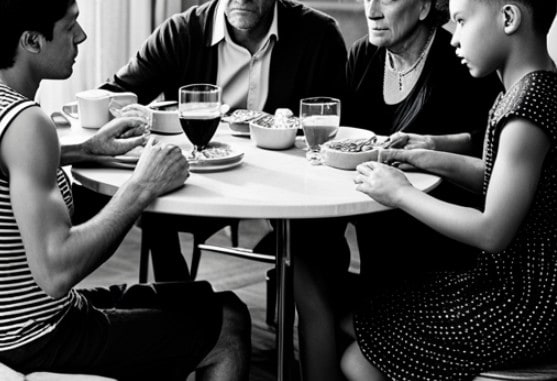The manner in which children are raised and nurtured influences their overall growth and development. Positive parenting is a particular child-rearing approach that emphasizes positive reinforcement, empathy, communication, and active listening.
This parenting style is crucial in raising emotionally stable, healthy, and well-rounded individuals. However, despite the numerous benefits of positive parenting methods, the influence of negative peer groups can undo all the hard work that parents have invested in nurturing their children.
Definition of Positive Parenting
Positive parenting is an approach to child-rearing that emphasizes positive communication and reinforcement techniques while avoiding punishment or negative consequences as much as possible. This approach involves setting clear boundaries and following them consistently while promoting children’s autonomy and independence. Furthermore, positive parenting promotes mutual respect between parents and children through honest communication and open dialogue.
Importance of Positive Parenting
Positive parenting has numerous benefits for both parents and children. Firstly, it fosters a strong bond between parents and their children by creating a safe emotional environment where trust can flourish. It also leads to better self-esteem since it encourages kids to be independent thinkers who are accountable for their actions.
Additionally, positive parenting promotes empathy towards others by encouraging kids to consider other people’s feelings when communicating or taking actions. The approach helps reduce negative behaviors such as aggression or bullying tendencies since it builds resilience skills among kids.
Negative Effects of Poor Peer Groups on Positive Parenting
Peer groups comprise individuals within the same age range or social circle who share common interests or experiences. However, some peer groups may promote destructive behaviors such as bullying activities or drug abuse tendencies that can negatively impact kids’ behavior.
Poor peer groups can undermine positive parenting methods by exposing kids to attitudes that contradict their values at home. For instance, if a parent has instilled values such as honesty in his/her child but he/she engages in dishonest activities, peer pressure may lead him/her to do things that go against these values.
Moreover, kids may feel alienated from their parents if they perceive their values as outdated when introducing them to their peers. If this is the case, parents need to communicate clearly with their children and understand the power of peer pressure on young individuals.
Poor Peer Groups and Their Impact on Positive Parenting
Definition of Poor Peer Groups
Poor peer groups can be defined as a group of peers who engage in behaviors that are harmful, negative, or counterproductive to healthy development. This can include behaviors such as drug use, delinquency, and risky sexual behaviors.
Children who are exposed to poor peer groups may start to adopt these negative behaviors themselves. Peer groups can be positive or negative in nature.
Positive peer groups typically encourage healthy behavior, such as academic achievement and community involvement. Negative peer groups tend to promote destructive behavior that can have long-term consequences.
How Poor Peer Groups Can Influence Children Negatively
Poor peer groups can influence children negatively in many ways. These negative influences can range from minor issues like the way a child dresses or speaks, all the way up to serious issues like drug addiction or criminal activity. One way that poor peer groups influence children is through social pressure.
Children may feel pressured by their peers to engage in risky behavior because they want to fit in with the group. They may also fear being ostracized by the group if they do not conform to its norms.
Another way that poor peer groups influence children is through exposure to new ideas and attitudes. Children who spend time with peers who have negative attitudes towards authority figures or exhibit antisocial behavior may start adopting similar viewpoints themselves.
Examples of Negative Behaviors and Attitudes That Can Be Learned from Poor Peer Groups
Children who spend time with poor peer groups may begin exhibiting a variety of negative behaviors and attitudes themselves. Some common examples include: – Drug use: If a child spends time with peers who use drugs, they may start experimenting with drugs themselves.
– Delinquency: Children who spend time with delinquent peers may start engaging in illegal activities like theft or vandalism. – Risky sexual behavior: Exposure to peers who engage in risky sexual behavior may lead children to engage in similar behavior themselves.
– Poor academic performance: Children who spend time with peers who do not prioritize education may become disinterested in school and perform poorly academically. – Negative attitudes towards authority figures: Spending time with peers who exhibit negative attitudes towards authority figures, such as teachers or parents, can result in children adopting similar attitudes.
Poor peer groups can have a significant impact on children and their development. It is important for parents to be aware of the peer groups that their children spend time with and take steps to address any negative influences that may be present.
The Factors That Contribute to Poor Peer Groups Undoing Positive Parenting Methods
Lack of Parental Supervision
Lack of parental supervision is a significant factor that contributes to poor peer groups undoing positive parenting methods. When parents fail to monitor their children’s activities or do not set boundaries, children are more likely to seek guidance and validation from their peers. These peers may have different values, beliefs, and norms than those taught at home.
Without proper guidance and supervision, children may engage in risky behaviors such as drug use, criminal activity or violence. This is because they lack the moral compass that positive parenting provides them with.
In many cases, parents may be working long hours or multiple jobs to make ends meet and cannot provide the necessary supervision. In other cases, parents may simply be unaware of their child’s social activities and peer group dynamics.
Low Socioeconomic Status
Socioeconomic status can also contribute significantly to poor peer groups undoing positive parenting methods. Children from low-income families are at higher risk for exposure to negative peer influences due to factors such as limited access to quality education, unsafe neighborhoods and less parental involvement in school activities. These children are also more likely to experience stressors associated with poverty such as food insecurity, housing instability and parental unemployment that can affect their emotional well-being.
Furthermore, low-income families often live in areas with high crime rates which expose children to violence and crime at an early age. This exposure can normalize negative behavior leading them down the wrong path.
Exposure To Violence And Crime
Exposure to violence and crime is another critical factor contributing towards poor peer groups undermining good parenting methods. Children who witness or experience violence at home or in their community are at a higher risk for developing behavioral problems such as aggression or depression.
Additionally, exposure to violent media content such as movies, TV shows or video games can desensitize children to violence and lead them to normalize it. This can lead them down the wrong path, undoing positive parenting methods that have been instilled in them.
Substance Abuse
Substance abuse is a prevalent issue among youth and is a significant factor contributing towards poor peer groups undermining good parenting methods. Children who use drugs or alcohol are more likely to engage in high-risk behaviors such as unprotected sex, criminal activity or violence.
Moreover, substance abuse can impair judgment leading to risky behavior, which can have long-term negative consequences on their personal growth and development. It is essential for parents to recognize these risk factors and take proactive steps to prevent their children from exposure to negative peer influences.
Parents should prioritize monitoring their child’s activities closely and encourage open communication about social experiences. By doing so, it will be easier for parents to detect early warning signs of negative influences on their child’s life.
Effects of Poor Peer Groups on Children’s Development and Well-being
Peer groups play a significant role in shaping children’s growth and development. A poor peer group can have a detrimental effect on children’s academic performance, emotional development, and behavioral issues. These negative effects can impact their future success and well-being.
Academic Performance
Children who associate with negative peer groups tend to have lower academic performance than those who do not. This is because poor peer groups may encourage behaviors that negatively impact learning, such as skipping classes, failing to complete homework or assignments, and engaging in disruptive behavior in the classroom. These behaviors can cause children to fall behind academically and miss important opportunities for learning.
In addition, children who are part of negative peer groups may also face disciplinary action from teachers or school officials that further disrupts their academic progress. The lack of positive role models within the group also means that children may not receive encouragement or support for academic achievement.
Emotional Development
Poor peer groups can also have a significant effect on a child’s emotional development. Negative behaviors such as bullying or teasing can lead to feelings of isolation and depression for the child being targeted. Children may feel the need to fit in with their peers by engaging in risky or inappropriate behavior, which can lead to feelings of guilt or shame.
In addition, being part of a poor peer group with low self-esteem individuals may discourage healthy emotional expression by discouraging open communication about feelings between peers. Children within a toxic environment might be forced to suppress emotions that they need help dealing with leading to unhealthy coping mechanisms such as substance abuse later on in life.
Behavioral Issues
Poor peer groups are strongly associated with behavioral issues among children due to exposure to negative behaviors. Children may be more likely to engage in delinquent behavior such as drug and alcohol use, theft, and vandalism when they are part of a negative peer group that encourages such activities. Negative peer groups can also influence children to ignore rules or disregard authority figures, leading to trouble both at home and at school.
Children who associate with negative peer groups are also more likely to struggle with aggression or confrontational behavior, which can lead to violent incidents or conflicts with others. These behavioral issues can have long-term consequences for the child’s future relationships and success.
Conclusion
Poor peer groups can have a profound impact on children’s development and well-being. Children who associate with negative peers often experience lower academic performance, emotional difficulties, and behavioral problems.
It is essential for parents to monitor their child’s social activities closely, encourage open communication about peer experiences while promoting healthy relationships among their kids. Parents must address behavioral issues proactively through early intervention programs so that children can overcome the negative influence of poor peer groups on their lives.
Introduction: As previously discussed, poor peer groups can have a negative impact on the positive parenting methods used in the home. However, there are strategies parents can implement to counteract the negative influence that peer groups may have on their children.
In this section of the article, we will discuss four effective strategies that parents can use to ensure positive outcomes for their children. Establish Clear Rules and Boundaries at Home:
One of the most effective ways to counteract the negative influence of poor peer groups is by establishing clear rules and boundaries at home. Parents who establish clear guidelines for behavior and expectations in the home create an environment where their children understand what is acceptable and what is not.
This clarity helps children develop strong self-discipline and decision-making skills, which are essential when interacting with peers. Moreover, when parents establish consequences for breaking rules or crossing boundaries, they provide their children guidance on how to make good choices in social situations.
The consistency in enforcing these consequences will help strengthen a child’s resolve to resist negative peer pressure. Encourage Open Communication with Children About Their Social Experiences:
Another strategy parents can use is encouraging open communication with their children about their social experiences. When parents take an interest in understanding how their child interacts with peers outside of the home environment, they gain insight into potential challenges that may arise.
By maintaining active communication lines between parent and child, it allows for a platform where any issues can be addressed before they escalate into bigger problems. Monitor Children’s Social Activities Closely:
Monitoring your child’s social activities closely is another powerful strategy that parents can utilize. By keeping tabs on your child’s interactions with peers both online and offline, you are better positioned to identify any undesirable behavior or harmful tendencies before they become problematic.
Parents should be proactive in knowing who their kids are spending time with outside of school hours or recreational activities. It could include monitoring cell phone usage as well as having open access to social media accounts.
With this level of monitoring, parents are positioned to take corrective action where necessary to ensure their children’s safety and well-being. Encourage Involvement in Positive Extracurricular Activities:
Parents can encourage their children to get involved in positive extracurricular activities such as sports teams or clubs. By participating in activities that promote teamwork, personal responsibility, and social interaction with positive role models outside the home environment, children will have increased exposure to more constructive peer groups.
Extra-curricular activities provide a great way for kids to thrive socially while avoiding negative influences that might hamper their personal growth and development. Conclusion:
Establishing clear rules and boundaries at home; encouraging open communication with children about their social experiences; monitoring children’s social activities closely; and encouraging involvement in positive extracurricular activities are all effective strategies that parents can use to counteract the negative influence of poor peer groups on their children. Negative peer pressure is a reality for many young people today but by proactively implementing these strategies into your parenting approach, your child will be better equipped to make good choices in difficult situations.
The Importance of Positive Parenting in Overcoming the Influence of Poor Peer Groups
Positive Parenting is a Protective Factor
It is important to understand that positive parenting is just one of many factors that contribute to children’s development, but it is a critical one. When parents engage in positive parenting behaviors, such as showing warmth and affection, setting clear rules and boundaries, and providing support and guidance, they help protect their children from negative outside influences. This means that even if children are exposed to poor peer groups or other negative factors, they are more resilient and better able to resist those influences if they have a strong foundation of positive parenting.
The Role of Parents in Mitigating the Influence of Poor Peer Groups
Parents have an important role to play in mitigating the influence of poor peer groups on their children. They can do this by establishing clear rules and boundaries at home, encouraging open communication about social experiences, monitoring their children’s activities closely, and providing opportunities for positive extracurricular involvement. These strategies help ensure that parents stay connected with their children’s lives and can intervene when necessary.
Supporting Positive Parenting: Ways to Help Parents Promote Resilience
Many organizations recognize the importance of positive parenting in promoting resilience among children. They offer resources such as parenting classes or workshops aimed at helping parents develop skills related to effective communication with their children, promoting healthy relationships with peers and adults outside the family unit, reducing disciplinary issues at home through effective discipline techniques like timeouts or other nonphysical punishments when appropriate for behavior modification purposes only etc.
Celebrating Successes: Examples of Positive Parenting Strategies Making a Difference
While there is no “one size fits all” approach to positive parenting – different styles work for different families – research shows that certain strategies consistently promote resilience among children. For example, parents who consistently provide warmth and support, set clear expectations, and communicate openly with their children have been shown to have more resilient children, even when those children are exposed to negative influences from poor peer groups or other sources. Celebrating the successes of parents who implement these strategies can help remind others of the importance of positive parenting.
Conclusion: A World Where Positive Parenting Prevails
While it is true that poor peer groups can undo the methods of positive parenting, it is not inevitable that this will happen. By providing resources and support to families, we can help promote positive parenting strategies that strengthen resilience in children.
We can celebrate successes and share best practices with parents to ensure they feel supported in their efforts to nurture healthy relationships with their kids. Ultimately, by promoting a world where positive parenting prevails over negative outside influences like poor peer groups, we can contribute to stronger families and healthier communities everywhere.




